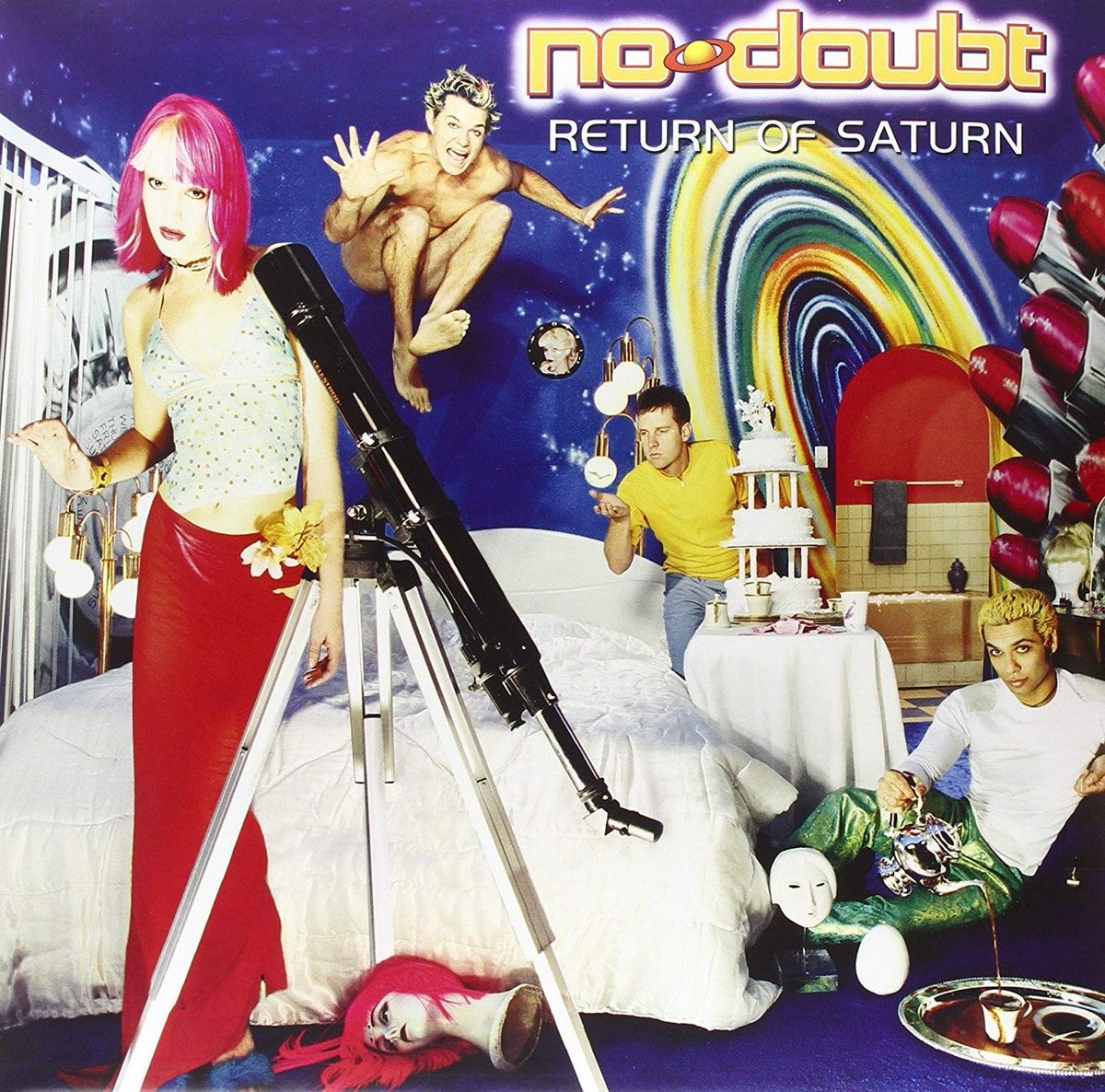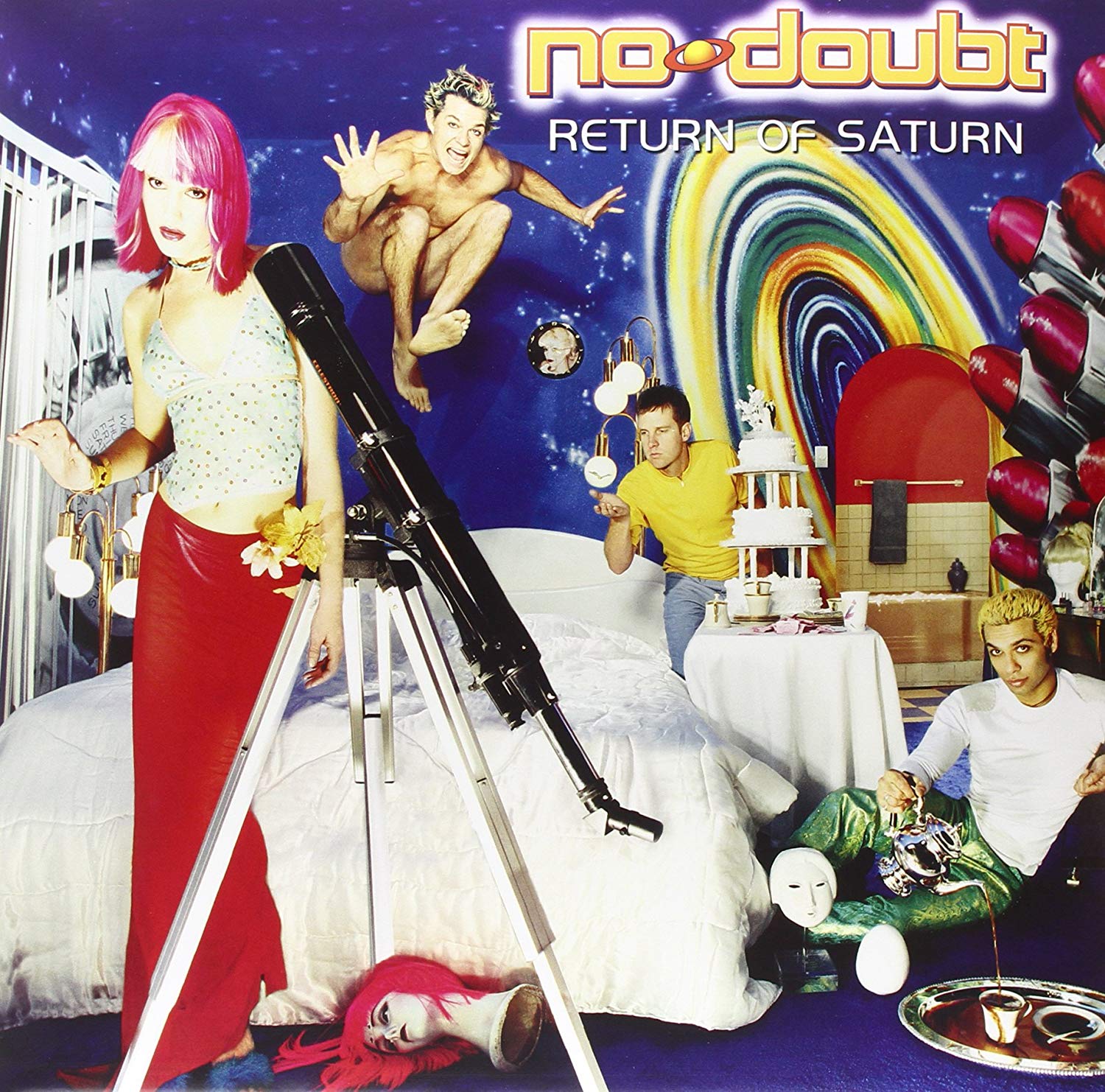"Return of Saturn" still rules, 20 years later
a tribute to the No Doubt album I've grown into

These days, Gwen Stefani is a coach on The Voice and a fixture in tabloids, and the band that she fronted is mostly a relic. After 2012’s disappointing reunion effort Push and Shove, no one is particularly clamoring for another comeback. No Doubt’s musical legacy persists largely on two albums, their 1995 breakthrough Tragic Kingdom (nineties kids know “Don’t Speak” and “Just a Girl”) and 2002’s chart-friendly reggae-pop Rock Steady (children of the aughts will remember songs like “Hey Baby” and “Hella Good.”)
But in between those two albums, No Doubt released Return of Saturn. And though it has largely been forgotten in pop culture, it’s their masterpiece. The album came into my life in middle school, when I was a recently converted Gwen obsessive eagerly devouring their back catalog. Of the CDs I horded after multiple trips to Best Buy, Return of Saturn stood out to me even then for its darkness, a level of inscrutability that made me play it over and over again. I imagined there was a code I could crack like the track references hidden in the mesmerizing Dave LaChapelle album art.

At age 29, I’m facing my own Saturn return, the astrological theory that your life changes right before age 30 when Saturn again appears in the same place it was on the day you were born. I understand this album completely now.
Gwen Stefani’s trajectory as a rock star and celebrity is an odd one. She lived with her parents until she was 26, having joined her older brother Eric’s band as a teenager and taken over lead vocals after the suicide of its original frontman. The band struggled in obscurity for a decade before the success of Tragic Kingdom; Gwen had gone back to school when the album took off and had to drop out to tour.
No Doubt’s lineup had already changed before their breakthrough album was even released. Tensions in the band had been high for a while — Gwen famously dated bassist Tony Kanal for seven years, their breakup inspiring many of the songs on Tragic Kingdom, and Eric Stefani felt his creative control slipping as the band evolved — and so Eric quit and returned to a job at The Simpsons as an animator. Gwen used to say, according to a Rolling Stone profile of the band from around this time, that her brother had created her persona as his own real-life cartoon character. “At first it was my brother’s songwriting and I was just doing what everyone told me,” she later said of those early years. “I was completely passive, no goals. I was in love with Tony and just happy to be in the band.” As No Doubt gained success, she realized that she had control of her career, too.
And so she started writing lyrics on her own, slowly experimenting with her bandmates over the course of a few years. The end product was Return of Saturn, a uniquely female rock album about Gwen Stefani’s biological clock. I’ll fight for any of the big three No Doubt albums, but there’s a reason I’m writing an essay about this one. Return of Saturn is excellent, a portrait of vulnerability empowered by a rock energy that still sounds incredible.

The songs on Return of Saturn tell a story of a woman grappling with what she really wants, someone who has gained success in one area but who feels desperately lacking in others. If Gwen felt she’d had no agency in becoming a star, that sense of helplessness was compounded by regret for the life she could have lived, the one she’d felt programmed for since her traditional, Roman Catholic childhood. Two of the standout tracks on the album, “Simple Kind of Life” and “Marry Me,” directly grapple with the prospect of compromising her successful career for a stable family life, or vice versa. At this point, Gwen had broken up with the man she met as a teenager, dated for seven years, and hoped to marry. Now she had to perform with him onstage every night and answer questions about their relationship in every interview about their smash album. At 29, she had entered her second-ever relationship — with another celebrity, Bush frontman Gavin Rossdale, adding to the whirlwind — and was facing down her 30s wondering if her dreams of domesticity would ever come true.
It’s the only album I’ve ever heard that focuses so much on birth control. The pill is depicted on the album cover and agonized over in songs like “Six Feet Under,” a synth-heavy bop about considering procreation in light of the inevitability of death. And, of course, every review of Return of Saturn mentions its standout gut-punch of a lyric, “I always thought I’d be a mom / sometimes I wish for a mistake,” from “Simple Kind of Life.” Themes of inevitability and control appear throughout the album, as Gwen veers from blaming outside forces for her existential indecision to harshly self-examining and listing her own flaws. In “Staring Problem,” which imagines a public meltdown triggered by seeing a more beautiful stranger, Gwen depicts her own insecurity as unhinged and pathetic. “Magic’s in the Makeup” explores image as a defense mechanism, while “Artificial Sweetener” more bluntly questions if she’s incapable of love.
Oh, and I should mention: the album is FUN AS HELL, a high-energy pop-rock album featuring some of the band’s catchiest songs. Though Gwen would describe the theme of the album as “confusion,” the production on Return of Saturn is confident and cohesive, which speaks to the amount of work the group put into it. They had written 40 songs before executive producer Glen Ballard came on board to sift out half of them. Some songs would be recorded but discarded as B-sides. One would be re-recorded multiple times. Two entirely new songs would be added at the eleventh hour after the album was thought to be completed.
Ballard, a pop-rock producer who had worked with another angsty woman on Alanis Morissette’s Jagged Little Pill, was not their first choice to lead the project. But after interviewing several options, guitarist Tom Dumont would later say of Ballard, “He spent as much time on the drum track as he did on Gwen’s vocals. Everything was important to him.” The attention to detail and willingness to treat the band like the group that it was is evident in the mix. Tony’s propelling bass, Tom’s layered guitars, and Adrian Young’s energetic drums all get their due, even as the sound of the album differed greatly from the California rock of Tragic Kingdom. Gwen said that Ballard served as “referee” for the band’s many ideas, and the album is certainly the better for the creative input of Tom and Adrian, who pushed for a harder rock edge to the mature ballads Gwen and Tony preferred. Adrian later said, “That was something I was constantly pounding on, telling Tom, ‘Put more distortion on your guitar!’ trying to sneak in fast tempos here and there.”
The result was something in between genres, expanding the group’s New Wave influences and bringing them further from the ska project Eric Stefani had envisioned at their inception in 1986. For an album released in 2000, it sounds remarkably untethered from Y2K trends, creating its own sonic universe with a distinct mix of ska horns, New Wave synths, and Spanish guitars. The band’s work with Elvis Costello on a one-off soundtrack single after Tragic Kingdom had pushed Gwen to expand her vocal expression from the cooing and warbling she was known for into something warmer and richer. It paid off beautifully in the album’s many introspective moments. Combined with the layered tracks and experimental sounds of the album’s production, this new sound felt heavier and headier. If Tragic Kingdom was angst, Return of Saturn was anxiety. The difference is more internal, more self-loathing, and infinitely more interesting.

Gwen’s confessional songwriting allows for voyeuristic speculation about her personal life, as she herself would later admit. In the years after Return of Saturn, Gwen would marry Rossdale and have three children with him. But his frequent infidelity was an open secret in Hollywood, and Gwen finally left him after 20 years together when he was caught with their nanny. Looking back on one of her many songs about their relationship, she recently said, “It’s weird to know that at the time, [those problems] were right there in front of me. When I went back to listen to some of the words, I was like, ‘I was saying it the whole time!’” Written during a rocky period in their courtship, the songs on Return of Saturn are full of these red flags. The first song on the album, “Ex-Girlfriend,” is a declaration that she knew from the beginning that they wouldn’t last; three songs in a row on the back half of the album wallow in the finality of a breakup that ultimately wouldn’t be permanent.
But the honesty lies in the blatant contradictions, even those that Gwen would later admit that she couldn’t accept. She declares that the thought of being one of the many women to have a fling with Rossdale “makes her sick” in “Ex-Girlfriend,” but she confesses on “Too Late” that she likes parading him around like an accessory “so I can sparkle and be the envy of my friends.” On “Dark Blue,” the album’s moody closer, she describes her partner’s baggage as frightening and upsetting, something she feels compelled to compensate for. On “Bathwater,” she finds delving into his past perversely exciting, a fucked-up but sexy game she can indulge in.
“Bathwater” is one example of how Return of Saturn dares to be weird in ways that make it even more compelling. Gwen’s lyrics oscillate between affectionate and disgusting, describing her jealous racing thoughts as “my pregnant mind… fat full with envy” and offering to bathe in her love’s old water and share his toothbrush as she gives herself over to him completely. This song is in swing time, a ska cabaret with a wailing vocal riffs and a brief spoken-word interlude. It’s absurd, and it works, and it’s delightful.
The “confused” mix of emotions inspiring the album led to new thematic territory and speaks to Gwen’s strength as a songwriter. That No Doubt is known for breakup anthems is cliche at this point. But has anyone ever, ever captured the feeling of the exciting start to a relationship better than the group did on “New?” Gwen sings about falling hard as equal parts toxic and intoxicating, the instrumentation building from romantic and dreamy to tense, then ecstatic. Arpeggiated synths zip along like electric shocks to the brain as she describes attraction as a fatalistic force of nature with lines like “You’re consuming me violently” and “My normal hesitation is gone / and I really gravitate to your will” in the verses. But her true feelings explode in the chorus, the guitars and drums and cymbals amplifying her dizzying emotion. “Don’t let it go away,” she repeats over and over. “This feeling has got to stay.”
Though “New” was originally recorded for another movie soundtrack, I can’t imagine Return of Saturn without it. For as tortured as love feels elsewhere on the album when Gwen gets in her head, for these four and half minutes we feel the same rush. The territory is dangerous, Gwen says, and she’ll probably end up broken-hearted and single all over again, and yet she cannot help but gush gratefully, “I can’t believe I’ve had this chance now.”
When I think of the album, though, the song that stands out to me is “Home Now.” Here, Gwen’s desire for a simple kind of life is not about societal expectations or even her own plans for herself — it’s about loneliness and the desire for your person to be there permanently, not just for the moment. “Some consistent tangibility… part of the furniture,” she asks for, bluntly and sadly. “I want to take you for granted.” Her words paint a picture of isolation and anxiety — “I’m hanging out with me / and you’re a vacant chair” — with “aimless expectations” passing through her brain, desires and needs without an end to latch onto. The devastating drum fills and that plaintive guitar slide immerse you in her longing.
Released five years after Tragic Kingdom and following a laborious recording process, Return of Saturn produced no big singles and saw disappointing sales. The band would opt for an easier way out on Rock Steady, bringing in scores of collaborators to make a radio-friendly pop album with a quick turnaround. I’m so glad we got Return of Saturn at all.
Of course I have considered the fact that No Doubt came into my life when I was leaving my own traditional, Roman Catholic childhood. The dream of family life that Return of Saturn described was my expectation for my own adulthood, one that has shifted as I’ve gotten closer to the age that Gwen was when she wrote it and experienced the difficulties of planning forever too carefully. But I’m thankful that I had this blueprint during my adolescence, a frank look at what it means to desire a family and career and feel trapped by your own choices. And it felt inspirational to me then — and feels cathartic, now — to experience the combination of such nakedly personal lyrics with the album’s energy and sound. On Return of Saturn, electric guitars, pounding drums, and soaring synths propelled honest lyrics about being a woman. Gwen Stefani was anxious and in love and confused, and this album revealed the power in owning all of that.
